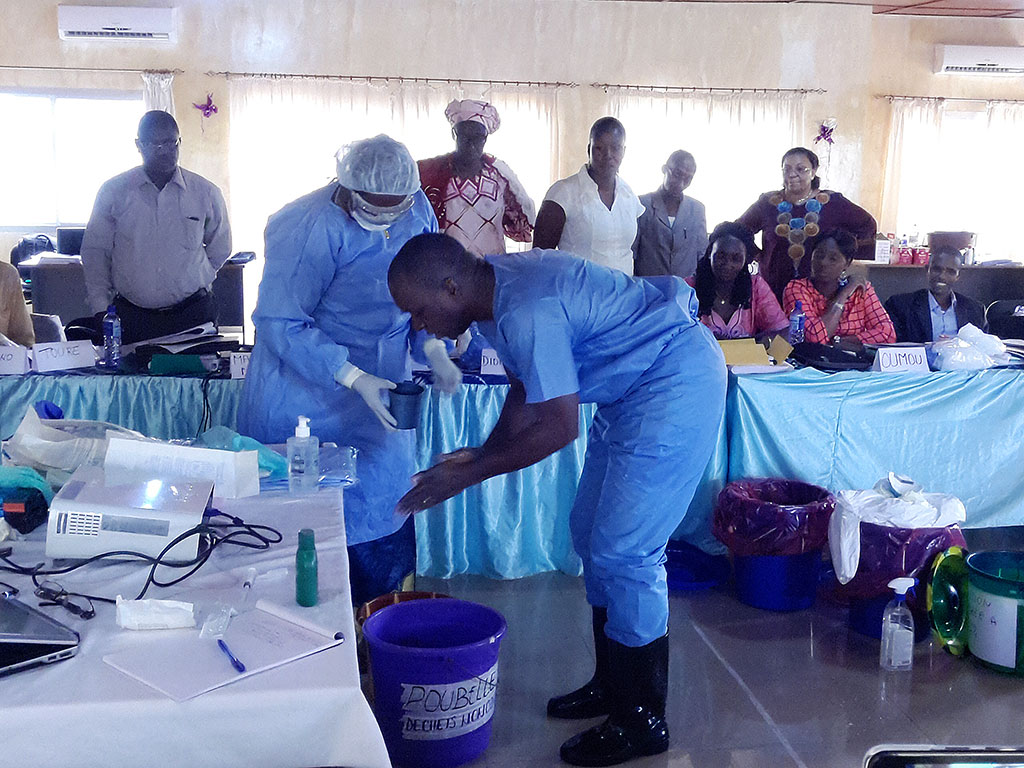This post originally appeared on the USAID IMPACT blog.
Conakry, Guinea—Dr. Thierno Souleymane Diallo is a formidable ally in Guinea’s race to prevent and contain the spread of the deadly Ebola virus. As a survivor of the disease, he is championing with colleagues the Infection Prevention and Control (IPC) skills that can save lives.
Last August, Dr. Thierno contracted Ebola during his rotation in the maternity ward at the Ignace Deen National Hospital last August. The 35-year-old father of three was infected while treating a pregnant patient who showed no Ebola-related symptoms, but who later tested positive for the disease. The doctor candidly admits that he could have avoided infection if he had known “to take every precaution.”
However, at the time, the hospital was not following recommended IPC practices and Dr. Thiero and five team members had to be isolated after contact. “I was the only one of the team to develop the disease,” he said.
Thierno spent 21 days in an Ebola treatment center run by Doctors Without Borders, suffering from bloody diarrhea, nausea, body aches and constant 104-degree fevers. “Sometimes Iprayed toGodto let me sleep, to forget my state…and when I woke up,I felt likemy entire body was full of lead,” he said.
When he received a visit from his wife during this period, he was so disoriented that he did not recognize her at first. From the designated visitors’ area of the center, Dr. Thierno and his wife had to call out to each other from distance of about three meters—over a wire fence and across an empty lane. Dr. Thierno remembers little or nothing of this visit.
Upon his release, Dr. Thierno spent another two and a half months at home recovering from severe joint pain. Upon returning to work, he participated in an update and refresher training for health workers during which he learned the importance of following proper IPC practices, especially during the Ebola outbreak.
The five-day training was organized by the USAID’s flagship Maternal and Child Survival Program (MCSP) in conjunction with the Ministry of Health in Guinea. The training used lectures along with simulated practical sessions and site visits to health facilities to allow for hands-on demonstrations of proper IPC to protect providers and their patients.
Dr. Thierno is now among 27 providers with updated skills who are managing a large-scale training—under the guidance of the USAID team—for 2,200 Guinean health care workers in IPC practices adapted for Ebola-impacted countries. They are also providing follow-up supportive supervision to these workers every two weeks as part of Ministry of Health efforts to keep frontline health workers safe and prepared to serve Guineans who may become ill.
Dr. Thierno believes he contracted the disease because he used only one glove on one hand during patient treatment in the maternity ward.
In subsequent trainings at his facility, he has reinforced to colleagues that one glove is not an acceptable practice. The solution of chlorine prepared for disinfection was also not the proper concentration.
Prior to the December training, Dr. Thierno did not know that high-level disinfection of instruments and equipment was analternative to sterilization, and said that his hospital would refer women to other facilities because sterile equipment was not available.
“This training has closed the door on ignorance related to infection prevention and opened a door on behavior change,” he said.

